Invited international
Panel leadership/moderator roles, a panellist of international panels, and other facilitator roles
My international research profile is evidenced by the number of invitations I received to lead events and visits, which is the reporting period of this submission. These opportunities provide the means to disseminate my research to international policy makers, industrialists and academics. They generate impact and enable me to play a leading role in shaping the built and human environment links to disaster mitigation and reconstruction, incorporating inclusiveness and social responsibility.
- A panellist of the Climate and Health Round Table on “ Dousing the Blaze: Setting Priorities for Integrated Action on Health Impacts of Climate Change “, held in Colombo, Sri Lanka from 21-22 April 2025, organised by Doctors Without Borders/ Médecins Sans Frontières (MSF). It was an effort to propagate and sustain the climate change and health discourse, thus creating space for a regional consensus on evidence-based interventions, particularly on the health sector. MSF is an international, independent medical humanitarian organisation that delivers emergency aid to people affected by armed conflict, epidemics, natural disasters and exclusion from healthcare.
- A panellist on sustainable e-waste management in Sri Lanka, held at the launch meeting of the urban E-clean research project, GAP HQ, Colombo, Sri Lanka, on improving e waste management in Sri Lanka.
- Invited Panellist by the UNDRR. International Panel on Restoring Livelihoods: Solutions for Disaster-Induced Displacement and Resilient Recovery, 7 April 2025. Co-organized by the UNDRR, International Organization for Migration (IOM), and the Internal Displacement Monitoring Centre (IDMC). It aimed to explore sustainable strategies for livelihood restoration and resilience-building in disaster-displaced populations and their host communities and provided a platform to share good practices, highlight innovative interventions, and foster collaboration among policymakers, the private sector, practitioners and stakeholders.
- Invited Panellist on the panel discussion on sustainable e-waste management in Sri Lanka, held at the launch meeting of the urban E-clean research project . 24th Marc h 2025. GAP R&D, Vidya Mawatha, Colombo, Sri Lanka.
- A resource person and a panellist of the RESSUMMIT 2025 – National Consultation on Disaster Management & Infrastructure Resilience in Changing Climate & Environmental Risks, held from 10-11 February 2025, organised by UNDP; National Disaster Management Authority, India; Ministry of Environment, Forest & Climate Change, and Department of Science and Technology, Government of India, and IIT Roorkee, India. This high-level national consultation brought together government agencies, policy institutions, and international organizations to advance disaster risk reduction (DRR), climate adaptation, and resilient infrastructure development. with key focus Areas: Loss & Damage; Climate Risk Strategies; National Adaptation Plan (NAP) & Resilient Infrastructure; Industrial Safety & Green Growth; Nature-based Solutions & Sustainability; Health, Inclusivity & Capacity Building in DRR
- Panellist of the international panel on Building a Resilient Sri Lanka: Sustainable Solutions for Water, Climate, and Infrastructure Challenges, at the International Conference on Sustainable Built Environment 2024. Organised by Curtin University, Colombo and Canadian Network for Sri Lankan Academics (CaNSLA) This panel brought together globally renowned experts to discuss innovative solutions for some of Sri Lanka’s most pressing challenges in sustainability, resilience, and development. My intervention was on Disaster Risk Reduction Strategies in Urban Development under Sri Lanka’s National Disaster Management Plan. December 2024.
- Moderator of the international panel and also a panellist on 2004 Indian Ocean tsunami – 20 years after. UNDRR Webinar : Early Warning Systems for Tsunami Preparedness and Response, 11th December 2024, in marking the 20th anniversary of the devasting 2004 Indian Ocean Tsunami. Experiences were shared from IOC UNESCO Tsunami section, Indian Ocean countries, the Russian Federation, the Euro-Mediterranean region and also from Chile.
- Invited panellist of the Fourteenth Session of the Intergovernmental Coordination Group for the Indian Ocean Tsunami Warning and Mitigation System (ICG/IOTWMS-XIV), Jakarta, Indonesia, 16–19 November 2024
- Invited panelist at the “Strengthening Disaster Risk Reduction through Science and Policy: A Multi-Level Approach” to see the highlights of the role of scientific and technical expertise in shaping disaster risk policies, at the UN Europe and Central Asia Regional Platform for Disaster Risk Reduction, Budva, Montenegro, 6th November 2024. The Regional Platform for DRR is hosted by the Government of Montenegro in collaboration with the UNDRR, and with the support of UNDP, the European Commission and the Council of Europe
- Panelists of the session on: “Strengthening Disaster Risk Reduction through Science and Policy: A Multi-Level Approach” on the highlights of the role of scientific and technical expertise in shaping disaster risk policies, at the Europe and Central Asia Regional Platform for Disaster Risk Reduction, Budva, Montenegro, November 2024. 2024 Regional Platform for DRR was hosted by the Government of Montenegro in collaboration with the UNDRR, and with the support of UNDP, the European Commission and the Council of Europe
- Resource Person, Tools and Methodologies for Urban Resilience Building Reducing disaster risks on an urbanizing continent. Seeks to build a consensus on the way forward to enable Member States to deliver on their commitments to the Sendai Framework and the African Union’s Programme of Action for its implementation in Africa, thereby contributing to the achievement of the 2030 Agenda for Sustainable Development and the ‘Agenda 2063: The Africa We Want’. The 9th Session of the Africa Regional Platform (AfRP-9), 21-24 October 2024, Windhoek, Republic of Namibia. A draft outcome document (Windhoek Declaration) for consideration and adoption by Ministers and Heads of delegations in Africa was prepared and to was endorsed at th 8th High-Level meeting held on 24 October 2024 back-to-back with the AfRP-9. The outcomes of the AfRP-9 and the High-Level Meeting will inform the agenda and the outcome of the 2025 Global Platform for DRR (2-6 June 2025, Geneva, Switzerland).
- Moderator of the session “Building Societal Resilience through Collaborative Experience” at the Disaster Research Days 2024, held from October 8-10, 2024, at the Austrian National Library in Vienna. More than 300 experts from research, practice, and policy came together to discuss the future of science and research for DRR. Disaster Research Days 2024 was organised by the European Commission – Community of European Research and Innovation for Security (CERIS) and UNDRR, European Science and Technology Advisory Board (ESTAG), Bundesministerium für Finanzen, Bundesministerium für Bildung, Wissenschaft und Forschung, Disaster Competence Network Austria, showcasing how integrated efforts can address today’s disaster challenges.
- An invited panellist at the PANEL on Building Resilience through Collaborative Learning and Action: the MCR2030 model, held at the Disaster Research Days 2024: Shaping the Future of Science and Research for DRR, held from 8-10 October 2024 at the Austrian National Library, Vienna, Austria. It was organised by the European Commission, UNDRR, Disaster Competence Network Austria, Federal Ministry, Republic of Austria – Education, Science and Research, and Finance. I deliberated on the 2 products The MCR2030 initiative in Europe and Central Asia has made: (1) urban heat and wildfire management as key priority focus areas, and (2) DRR new dimensions, COVID – 19 preparedness at the local level
- Chairperson of the Panel Discussion at the LAUNCH OF THE BOOK: “BUILDING A BODY OF KNOWLEDGE IN PROJECT MANAGEMENT FOR DEVELOPING COUNTRIES”, held on the 22 August 2024. It holds a body of knowledge in Project Management in Developing Countries and presents a state-of-the-art account of the recent developments and needs in developing countries.
- Invited panellist, UNDP and UNDRR Expert Stakeholder Consultation on Coherence Pathways report in Europe and Central Asia. My intervention was on Coherence in Theory and Practice. 30 September 2024.
- Invited panelist and mission member, Capacity Assessment Validation Workshop: 2024 Tsunami Preparedness Capacity Assessment in Indian and Pacific Oceans Project, and the Meeting of 2024 IOC/UNESCO IOTWMS Capacity Assessment Tsunami Preparedness, 4-6 September 2024. Organised by UNESCO in partnership with UNESCAP, Swiss Agency for Development and Cooperation SDC, and Asian Development Bank.
- Panellist, Disasters and Governance: Enhancing the Agency of People through Disaster Justice within Disaster, RGS-IBG Annual International Conference organised by the Royal Geographical Society at the Imperial College London, August 2024.
- Session moderator, Panel Discussion at the LAUNCH OF THE BOOK: “BUILDING A BODY OF KNOWLEDGE IN PROJECT MANAGEMENT FOR DEVELOPING COUNTRIES”, held on 22 August 2024
- Moderator of the session on “Moving forward’, reflecting on fostering a transdisciplinary approach and multi-stakeholder collaboration for solutions to risk challenges, and represented the E-STAG at the 3rd Global Meeting of R-STAGs, held on the 25 June 2024 , an annual snapshot of Global STAGs’ contributions to the Risk Science Research Agenda; to share experience, practice, success and promote learning in the way disaster risk is understood and managed, and to chart a course for the better integration of science, research and technology in risk reduction practice by demonstrating new approaches and new opportunities. The European Scientific and Technical Advisory Group (E-STAG) is a UNDRR group of experts providing scientific and technical support to European and Central Asian countries on the implementation of the Sendai Framework
- Facilitator, IS YOUR BUSINESS READY FOR THE NEXT DISASTER?: DEVELOPING A LOCALISED BUSINESS MANAGEMENT TOOLKIT FOR SMALL TO MEDIUM SCALE BUSINESS ENTERPRISES IN SABARAGAMUWA PROVINCE, SRI LANKA, Data collection and toolkit development, May 2024, organised by Sabaragamuwa University, and Ministry of Social Welfare , Probation & Childcare, Rural Development and Rural Industries in Sri Lanka
- Expert input towards the Collaborative Expert Discussion on Biomimicry for Flood Resilience: Better integration of green and blue infrastructure for restoring the natural hydrological processes within the built environment, 21st May 2024, organised by GAP Resource Centre and University of Peradeniya
- Member of the UNDRR expert group for Montenegro National DRR strategy assessment: Supporting the national strategy development process. April 2024. Group of 13 experts, coordinated by the UNDRR, This exercise was requested by the Government of Montenegro as part of the revision of the 2018-2023 DRR strategy
- Member of the Expert Roundtable discussion on Environmental Hazards in the Democratic People’s Republic of Korea (DPRK), to develop new scientific partnerships between the UK and DPRK, concerning hazards, vulnerability, resilience and adaptation. Climate change is increasing the frequency and severity of meteorological and related hazards. For northeast Asia, it is expected that increasing humidity and temperature will amplify the threats of heavy rainfall and heatwaves. It was organised by NERC Knowledge Exchange, Mount Paektu Research Centre (MPRC), University of London, National Committee for Emergency and Disaster Management (SCEDM) and the British Embassy in the DPRK, and supported by the UK FCDO, will convene members of the UK DRR and hazards community with the aims of discussing the key hazards facing the DPRK and identifying potential collaborative projects with the DPRK. 25th March 2024.
- Panellist, Global Workshop on Climate Change and Urban Resilience: Cities’ Responses to Disasters and Extreme Weather Events, Experiences and Lessons Learned from City Responses, Co-organized by Beijing Normal University and the World Bank, January 2024
- Moderator, Panel Discussion on Built Environmental processionals tackling climate change. Held as part of BEACON – Built Environment Learning for Climate Adaptation, 13th March 2023, Colombo, Sri Lanka.
- Panellist, Disaster resilience: Reducing vulnerability through improved land administration and financing – RICS WBEF Week 2023. With Infrastructure Solutions; Swiss Re, and MapAction. While there are several joint efforts to prevent natural disasters and to reduce the damage caused by hazards, land management, land administration, data and the flow of finance following disasters require more attention. How can land tenure be secured, transparency increased and access to land to reduce vulnerability granted? How can improved data and financing support early recovery efforts? 18th January 2023; Organised by: RICS London
- Moderator, Joint International Seminar Series on Disaster Risk Reduction Research and Education – Cities. India Japan Laboratory of Keio University (Japan) and Global Disaster Resilience Centre of University of Huddersfield (UK). Goals of the session included: To conduct original scientific research on case examples to understand today’s most pressing issues on DRR; To have dialogue on research outcomes for joint review on the framework of analysis on DRR; To find out the factors that will overcome scientific barriers to construct a framework of DRR education where resilience to disasters is the key. Date: 1st February 2023, Wednesday.
- Panellist, Multi-hazard response at grass-root level. intervention on the role of academia and universities in strengthening community-based Disaster Risk Reduction (DRR); Organised by: National Dengue Control Unit, Ministry of Health, Government of Sri Lanka. Strengthening the hands that matter: Enhancing the preparedness and response capacities of grassroot level public health workers and first responders in multi-hazard scenarios and complex emergencies, held as part of Scenario-Based Training on Multi-Hazard Situations and Complex Emergencies for Grassroot Level Public Health Workers and First Responders. Date: 22nd February 2023
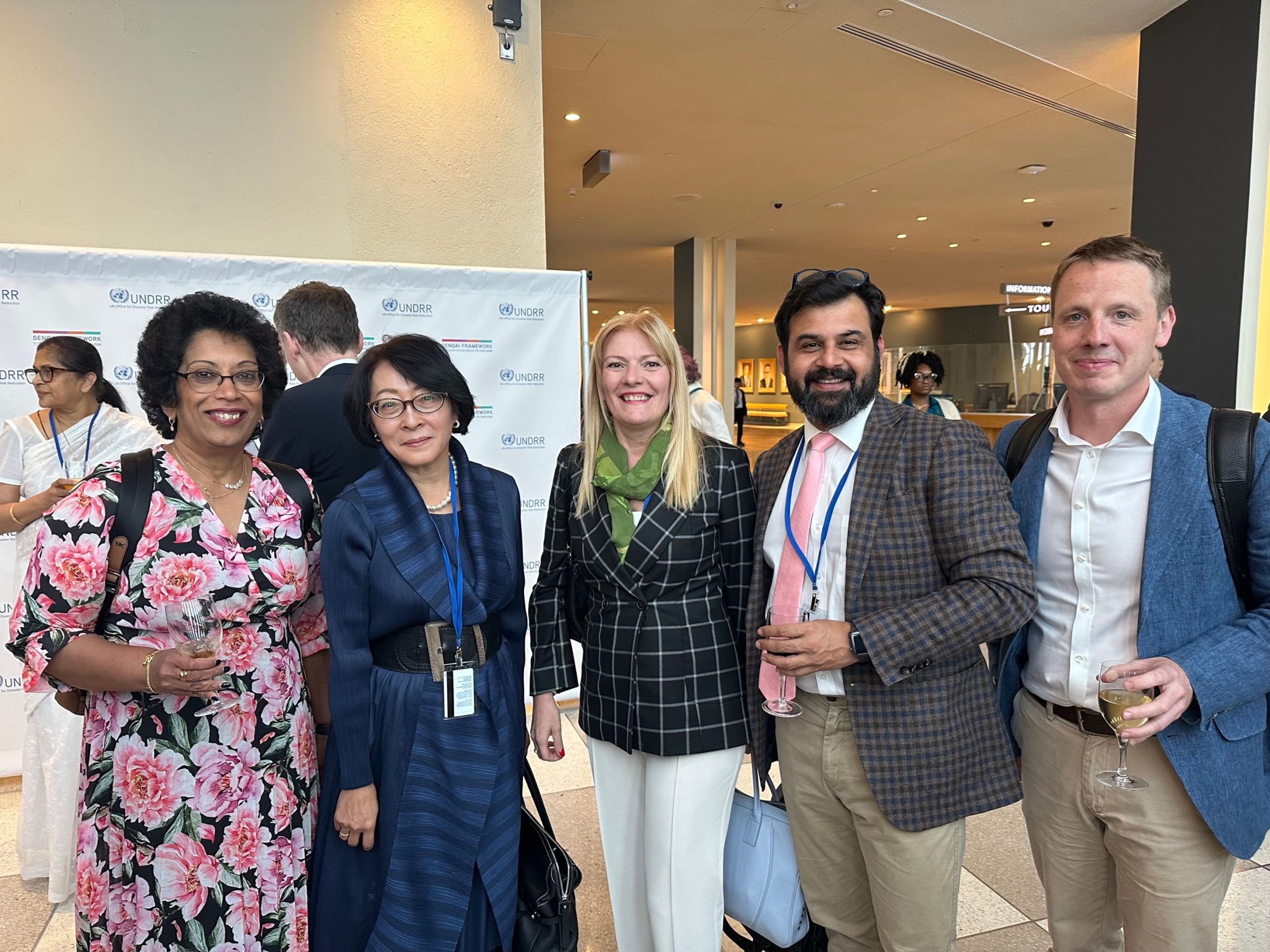
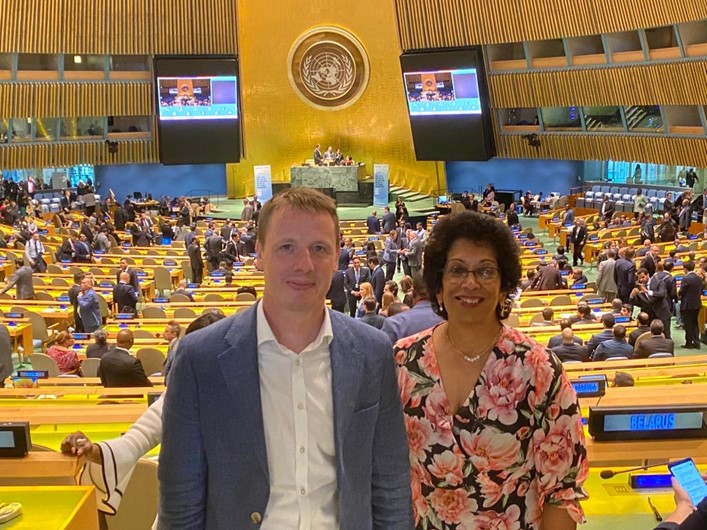
- Panellist, International network “Connect4Resilience” – disaster research, climate crisis & social work. Organised by: Swiss Federal Institute of Technology ETH, the University of Zurich and the Zürcher Fachhochschulen, Zurich University of Applied Sciences, Switzerland. The idea of the “Connect4Resilience Network” stems from our personal but also professional understanding as action-oriented researchers and knowledge brokers continuously aiming for better understanding and building bridges between theory, practice, and policy in the field of Social Work, Disaster Research and Aid Governance. The network is funded by the Swiss National Science Foundation (SNF), led by Dr Pia Hollenbach, from University of Lausanne, Switzerland; and has 15 other collaborators across UK, USA, Switzerland, Germany, Zimbabwe, and Austria; Date: April 2023
- Invited by the United Nations, high-level meeting on the Midterm Review of the Sendai Framework for Disaster Risk Reduction 2015-2030, United Nations headquarters, New York. The Midterm Review of the Implementation of the Sendai Framework for Disaster Risk Reduction 2015-2030 (MTR SF) takes stock of implementation, assesses progress and challenges; identifies shifts in context, new and emerging issues since 2015; and examines options for accelerated and amplified action in risk-informed decision-making, investment, and behaviour. The MTR SF is an opportunity to identify and implement renovations, innovations and course corrections to policy, practice, investment, and cooperation to prevent, mitigate and reduce existing and emerging risks before 2030. Date: May 2023
- Panellist of the Leaders’ Roundtable on Disaster Risk Reduction. High-Level Meeting on the Midterm Review of the Sendai Framework for Disaster Risk Reduction, United Nations Headquarters, 18 May 2023. Leaders’ Roundtable was chaired by E. Mr. Csaba Kőrösi, President of the United Nations General Assembly with Ms. Amina Mohamed, Deputy Secretary General of the United Nations delivering opening remarks represented the academia at its Leaders’ Roundtable on Disaster Risk Reduction, upon invitation by Ms Mami Mizutori, Special Representative of the Secretary-General for Disaster Risk Reduction, and the of Head of UNDRR. My intervention was on “A One Health Approach for ecosystem health and pandemic preparedness” where I highlighted the need for robust surveillance and early warning systems as a critical component of pandemic preparedness, and the need to advocate for a multisectoral, collaborative approach to pandemic preparedness, bringing together health professionals, disaster management experts, and other stakeholders.
- Invited by the United Nations to be part of scaling up risk sensitive urban development, United Nations headquarters. Organised by the Making Cities Resilient 2030 (MCR2030) global partnership. Convened by the United Nations Office for Disaster Risk Reduction (UNDRR), MCR2030 has mobilized more than 1,520 local governments from 75 countries and territories, with a combined population of 482 million people. The partnership also includes international organizations, national governments, private sector enterprises, academic organizations, and NGOs with unmatched experience of supporting greater urban resilience.; Organised by: United Nations General Assembly; Date: 18th May 2023
- Panellist, Disaster Research Group – UK Alliance on Disaster Research joint meeting. Interventions were on: (1) How can UK funded research maximise influence with major global reviews e.g. Sendai mid-term, both to help shape framing and provide input?; (2) Shape framing and input provision – Need for Transboundary, regional and international cooperation, and UK science influence more directly into the UN system; Organised by: UK Collaborative on Development Research (UKCDR) at Welcome Trust, London; Date: 26th June 2023
- Chair of the panel discussion – major gaps, challenges and opportunities. Organised as part of: International Symposium on Tacking Climate Change as an Underlying Disaster Risk Driver, University of Huddersfield, UK, Date: 27 June 2023
- Panellist of the launch event for the flagship programme: Cities by citizens, CommonwealthAssociation of Planners Young Planners. Challenges and potential solutions for inclusive community engagement and representation in the planning process, and the potential of participatory and inclusive planning to contribute to better urban, rural and marine environments, and to enable investment and delivery. Organised by: Commonwealth Association of Planners Young Planners. Date: 20th July 2023
- Moderator of panel discussion on Disaster risk reduction education, research and policy in Sri Lanka: Challenges and recommendations for scaling up. Organised as part of the National Conference on Disaster Risk Reduction and Management in Sri Lanka: Science, Policy and Practice, Centre for Disaster Management Research (CDMR-KDU), General Sir John Kotelawala Defence University, Ratmalana, Sri Lanka. Date: 25th July 2023
- Panellist of the panel discussion on Tackling the complexities and cascading impacts of multi-hazard scenarios amidst a public health crisis. Organised as part of the Sri Lanka Medical Association (SLMA) 136th International Anniversary Medical Congress, BMICH, Colombo, Sri Lanka. Date: 25th – 28th July 2023
- Panellist of the Official launch of the research brief on the key insights and recommendations: Public health information sharing among underprivileged groups and vaccine hesitancy during the COVID-19 pandemic in Sri Lanka. An international study was carried out to: investigate social factors that affected vaccine hesitancy during the COVID-19 pandemic in Sri Lanka; and, explore the challenges of public health information sharing during an epidemic or pandemic among underprivileged groups in Sri Lanka. This study involved a survey covering 26 divisional secretariats in 9 districts in Sri Lanka. The field study was designed to cover estate, rural, urban, semi-urban and urban sectors. A total of 3,330 households were covered by the study. This research provides deep insights into the vaccination programme conducted in Sri Lanka, especially about public response to the vaccination programme, vaccine hesitancy, vaccine preference and status of public health information sharing among communities. Organised by: Sri Lanka Medical Association. Date: 25th – 28th July 2023
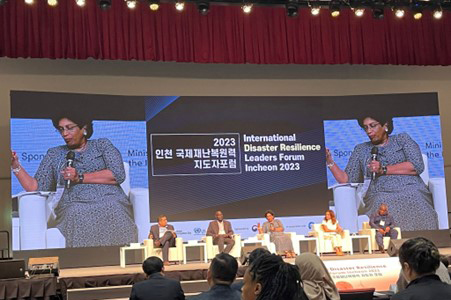
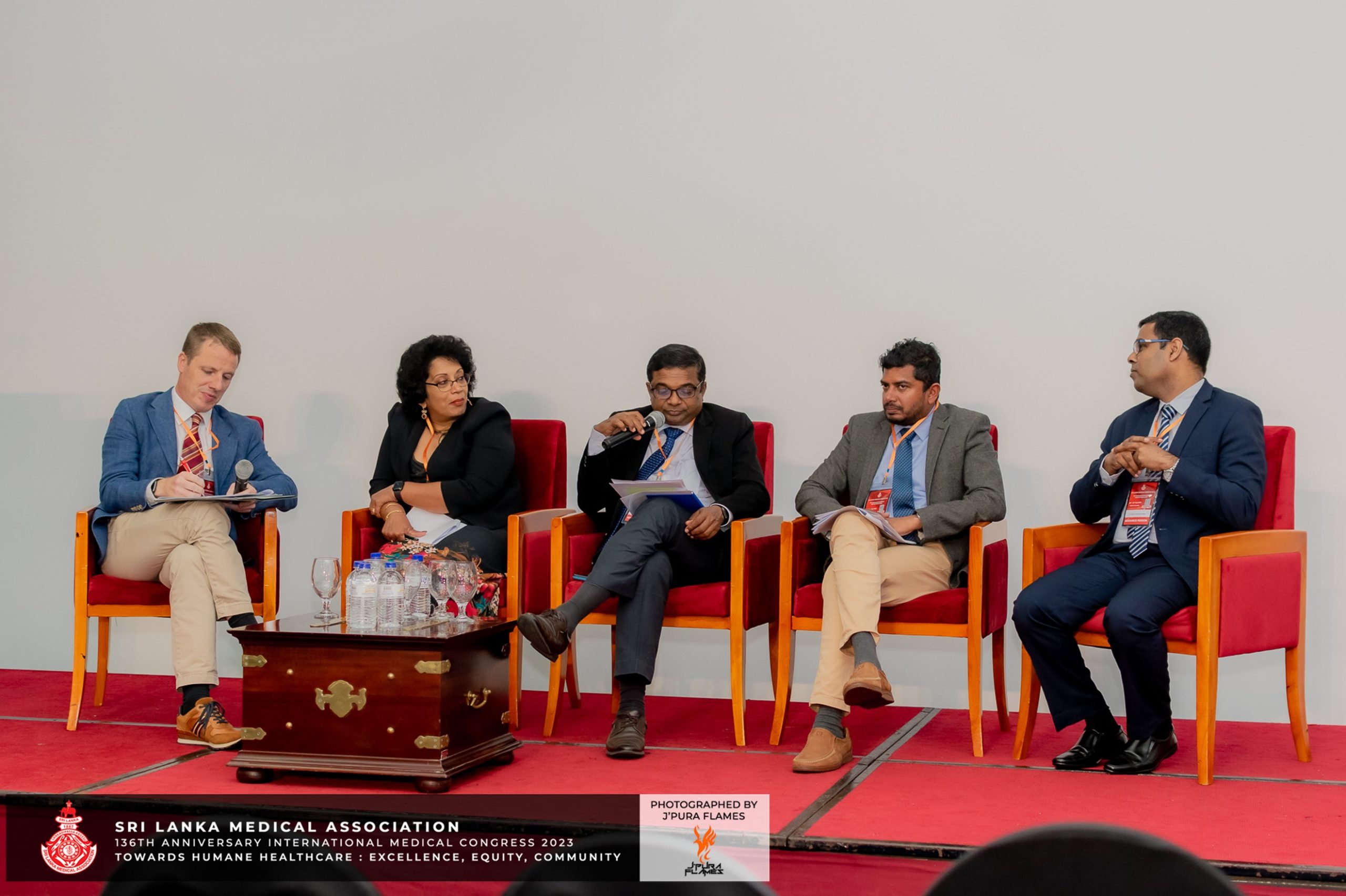
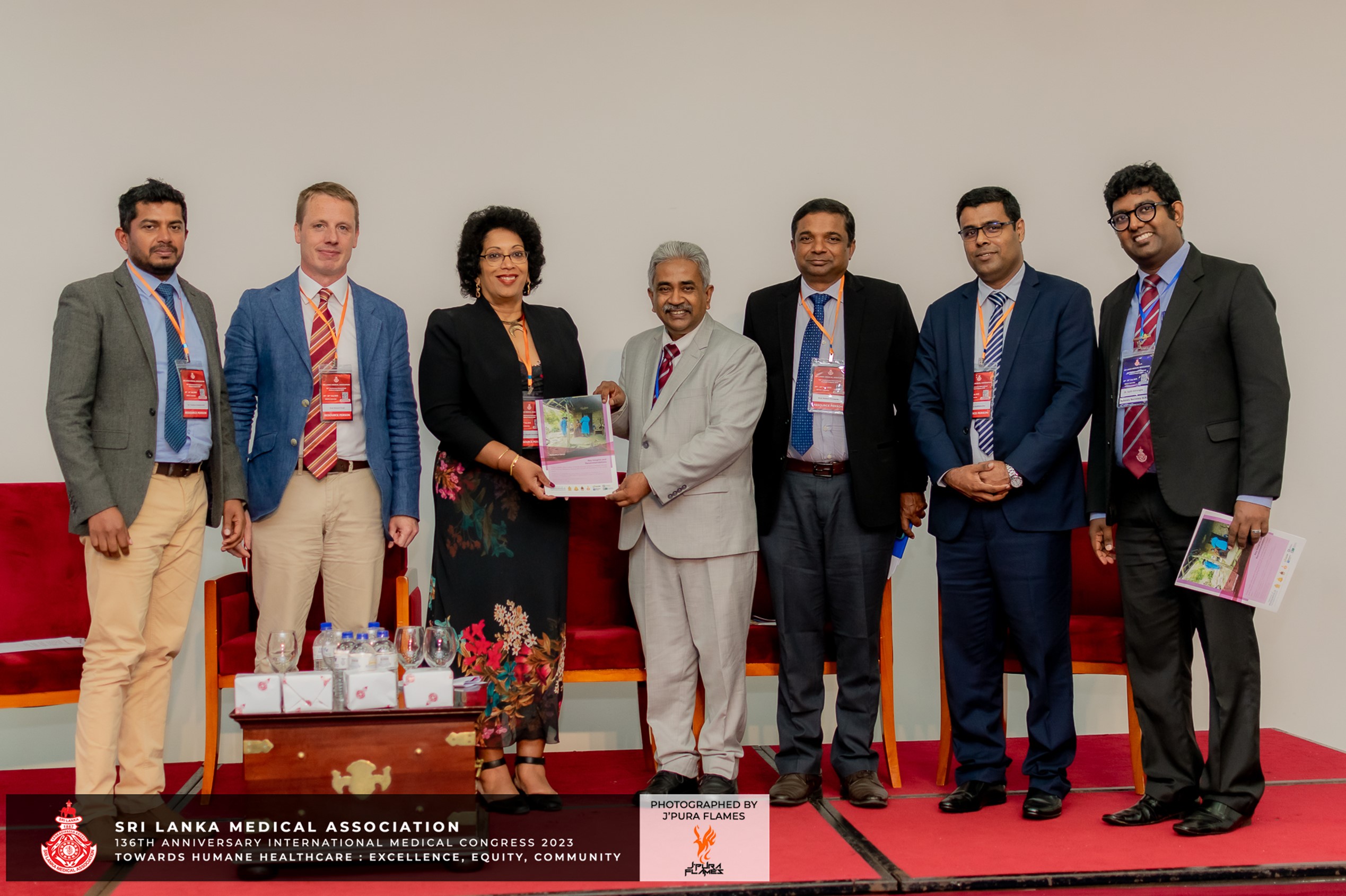
- Moderator of panel discussion on the urban best practices in technology application for disaster risk reduction from MCR2030 Cities Globally. Organised by: Ministry of the Interior and Safety, Incheon Metropolitan City, the Incheon Institute, UNDRR, Making Cities Resilient 2030, and Trilateral Cooperation Secretariat, People’s Republic of China, Japan, and the Republic of Korea, held in Songdo, Incheon, Republic of Korea Convension Center. Date: 18th – 19th September 2023
- Panellist of Bridging the gap between science and policy makers. Title of the event: Stakeholder forum on improving collaboration and transfer from research to policy makers in the DRR context. Organised by: Maison des Associations Internationales, (MAI), Brussels, Belgium, Dates: 26th – 28th September 2023
- Panellist of the session Strengthening disaster risk governance to manage disaster risk, at the Arab-Africa Science and Technology for Disaster Risk Reduction Conference, Organised by the Government ofTunisia in collaboration with UNDRR. Dates: 2nd – 3rd October 2023
- Moderator of the Panel Discussion on Disaster risk reduction education, research and policy in Sri Lanka: Challenges and recommendations for scaling up. Organised as part of the National Conference on Disaster Risk Reduction and Management in Sri Lanka: Science, Policy and Practice, Centre for Disaster Management Research (CDMR-KDU), General Sir John Kotelawala Defence University, Ratmalana, Sri Lanka. Date: 25th July 2023. Venue: Conference venue, National Conference on Disaster Risk Reduction and Management in Sri Lanka: Science, Policy and Practice, Centre for Disaster Management Research (CDMR-KDU), General Sir John Kotelawala Defence University, Ratmalana, Sri Lanka. The focus of discussion will be to identify the current state of the art of Sri Lanka DRR research base, examples of successful research and impact and recommendations for action and research where science and practice for disaster risk reduction can enhance DRR research and DRR policy interface. Findings from this panel discussion will be shared widely, and it will be incorporated into a synthesis statement drawing from the conference.
- Panellist, Panel Discussion on Tackling the Complexities and Cascading Impacts of Multi-hazard Scenarios Amidst a Public Health Crisis, 26th July 2023. Sri Lanka Medical Association (SLMA) 136th International Anniversary Medical Congress, 25th – 28th July 2023, BMICH, Colombo. The Covid-19 pandemic has challenged our existing disaster and emergency management policies and strategies, including our approaches for community engagement. Now is an opportunity to rethink the intersectoral nature of disaster risk management and consider how we can better address multiple and cascading hazard threats.
- Panellist, Disaster Research Group – UK Alliance on Disaster Research joint meeting. Hosted by the UK Collaborative on Development Research (UKCDR) at Welcome Trust, London, 26 June 2023. The aim of this meeting is to review the ways through which UK funded research on risk in an ODA context is being made relevant and impactful. What elements of research management, practice and support could be enhanced or revised so that the UK based research community can make the biggest contribution possible to reducing natural hazard and climate change risk and enhancing inclusive resilience in low- and middle-income countries (LMICs). The UK Collaborative on Development Research (UKCDR) is a group of government departments and research funders working in international development. It convenes impartial fora for discussion on key themes, identified through mapping and analysis work, where joint or complementary research investment has the potential to increase impact for developing countries. One of these groups is the Disasters Research Group. The Disasters Research Group (DRG) has been regularly convened informally since 2009 for members to enhance research and technology-based disaster risk reduction (DRR) through improved coordination of UK and international funders, research providers and users. My interventions were on: (1) How can UK funded research/ers maximise influence with major global reviews e.g. Sendai mid-term, both to help shape framing and provide input? (2) Shape framing and input provision – Need for Transboundary, regional and international cooperation, and UK science influence more directly into the UN system.
- Panel chair, Special Session on Project SECRA Moodle Launch, organised by the SECRA Project Sri Lanka partners consortium, 17th December 2022. This panel was conducted as part of the Strengthening University-Enterprise Collaboration for resilient Communities in Asia (SECRA), in collaboration with 13th International Conference on Sustainable Built Environment (The Kandy Conference). Session consisted of Introduction to the UEC/ SECRA Moodle; Official SECRA MOODLE Launch; and Introduction to the UEC Compass.
- Panellist, Panel discussion on the Building Resilience in Tropical Agro ecosystems in Changing Climate, 17th December 2022, Earl’s Regency Hotel, Kandy, Sri Lanka, organised by International Project BRITAE. The panel discussion aimed to share the results of the research conducted by the project and project outcomes in Building Resilience in Tropical Agroecosystems pertaining to Sociology, engineering, food security, agribusinesses etc. for building disaster resilience in changing climate. The BRITAE project aims at developing joint curricula modules on building resilience in tropical agro ecosystems in Sri Lankan universities to increase their capacity to modernise and enhance the quality and relevance of education of students to meet the challenges of the global market needs while ensuring international cooperation. The intervention was on: What is the significance of ecosystems (agro-ecosystems or natural ecosystems) and eco systems resilience on disaster risk reduction and mitigation.
- Moderator of the Panel Discussion on How can we adapt the built environment to mitigate the effects of climate change during design, construction and retrofitting? 17th December 2022, Earl’s Regency Hotel, Kandy, Sri Lanka, organised by International Project BEACON. To better protect these urban centres, adaptation to climate change will be vital. In addressing this adaptation challenge, there is a need to change the way in which we design, construct, retrofit, and maintain the built environment. In the process of climate change adaptation, the adaptation measures in the built environment during design, construction and retrofitting become the kick-off point since it will dictate the outset of the built environment in future. There is a clear need to change the way in which we design, construct, retrofit, and maintain to accommodate the anticipated changes. In framing the climate adaptation challenge for the built environment, it is most appropriate to align this with the SDGs and SFDRR as they demarcate and set out the global standards in addressing the climate change impacts, climate change as a key enabler for disasters, and sustainable development.
- Invited International Panellist, Global Recovery and Preparedness for the Pandemic, The All-India Disaster Mitigation Institute (AIDMI), November 18, 2022. This roundtable was focused on the various recovery and preparedness concerns related with the pandemic across the world. Focussing on recovery is important because preliminary evidence (World Bank) suggests that the recovery from the crisis will be as uneven as its initial economic impacts, with emerging economies and economically disadvantaged groups needing much more time to recover pandemic-induced losses of income and livelihoods. Similarly, focussing on pandemic preparedness by harnessing the lessons learnt in the previous two years is vital. Such planning to pandemic preparedness and response is the only way ahead to evolve resilient communities, societies and economies.
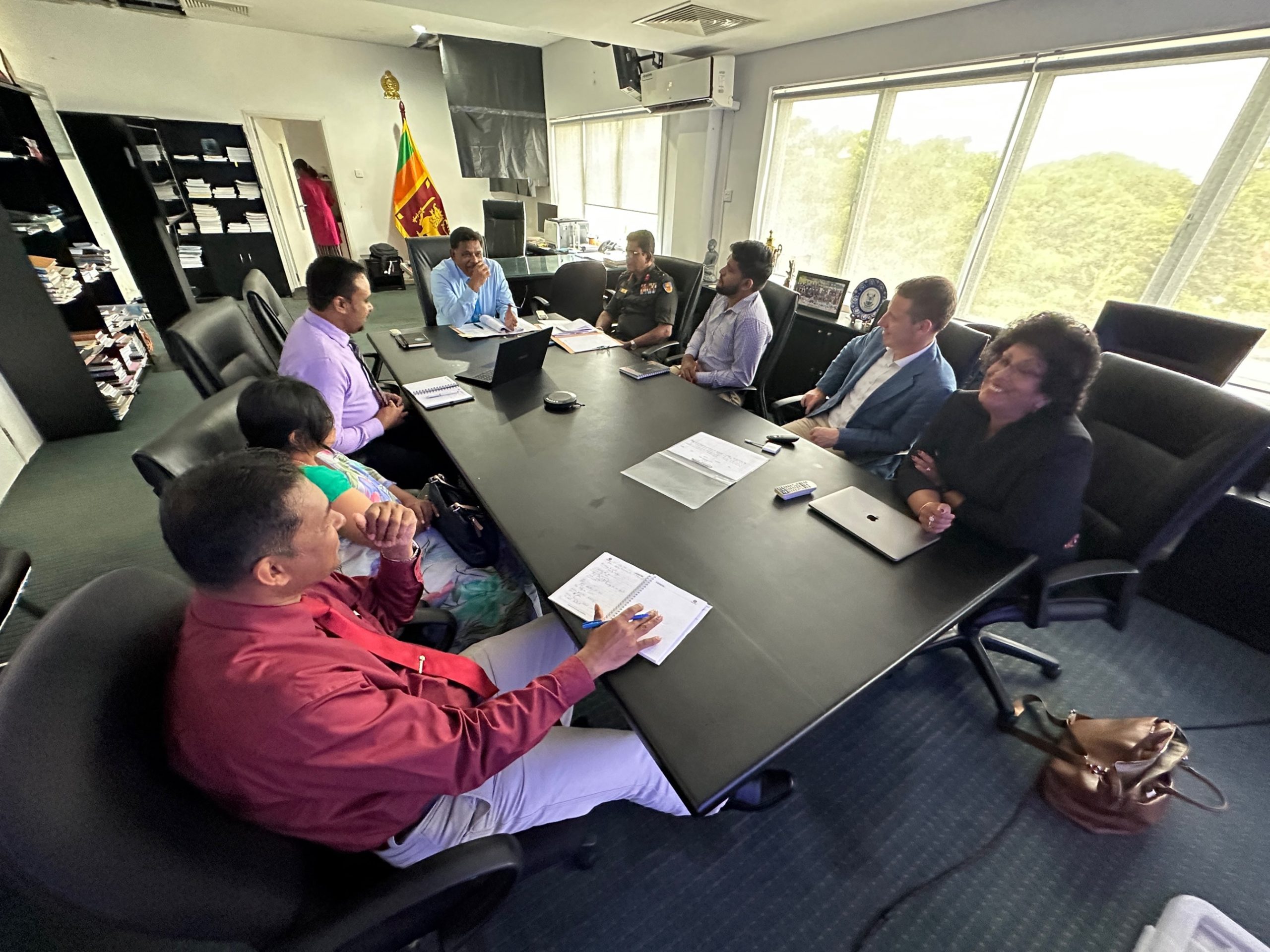
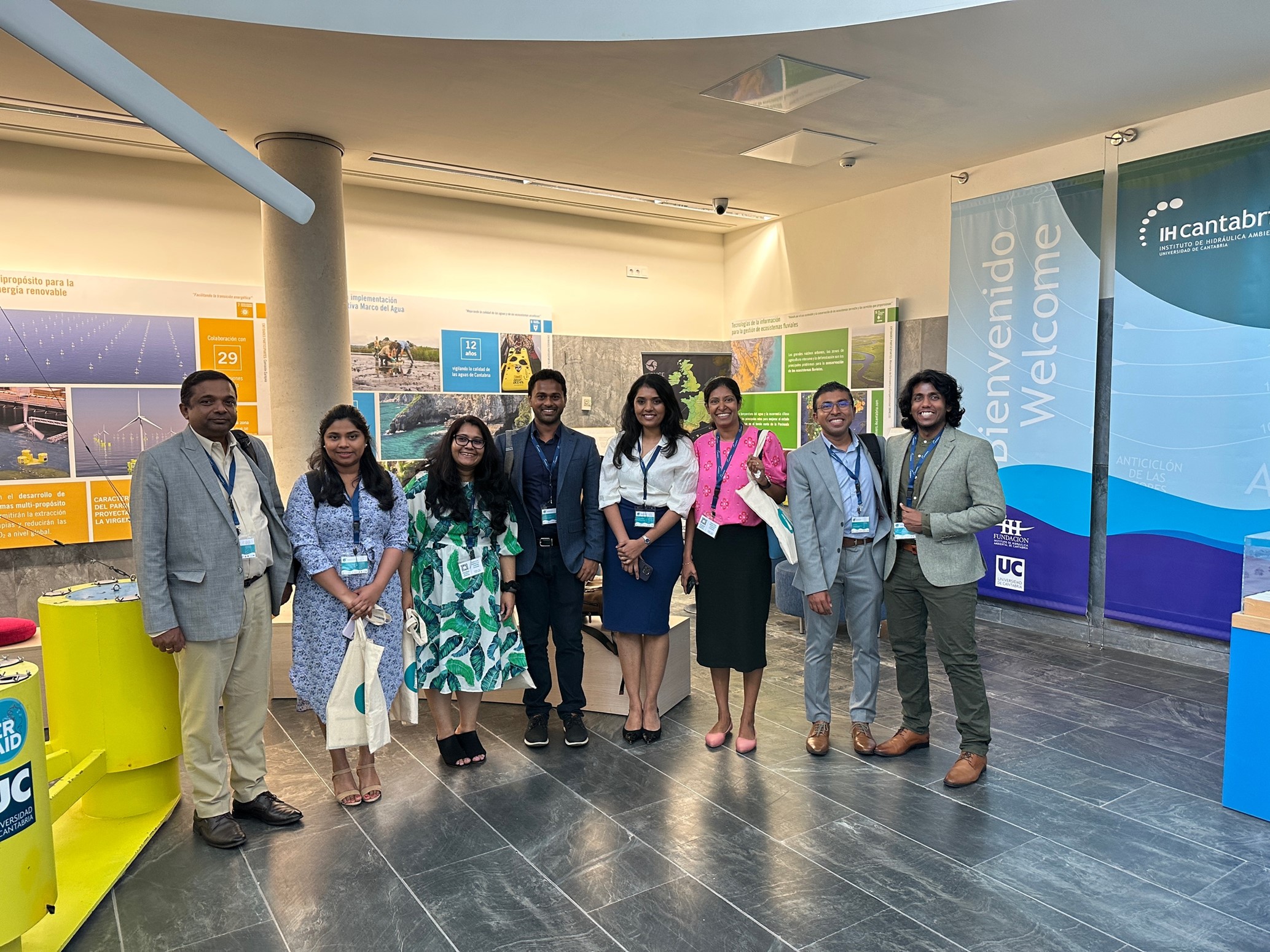
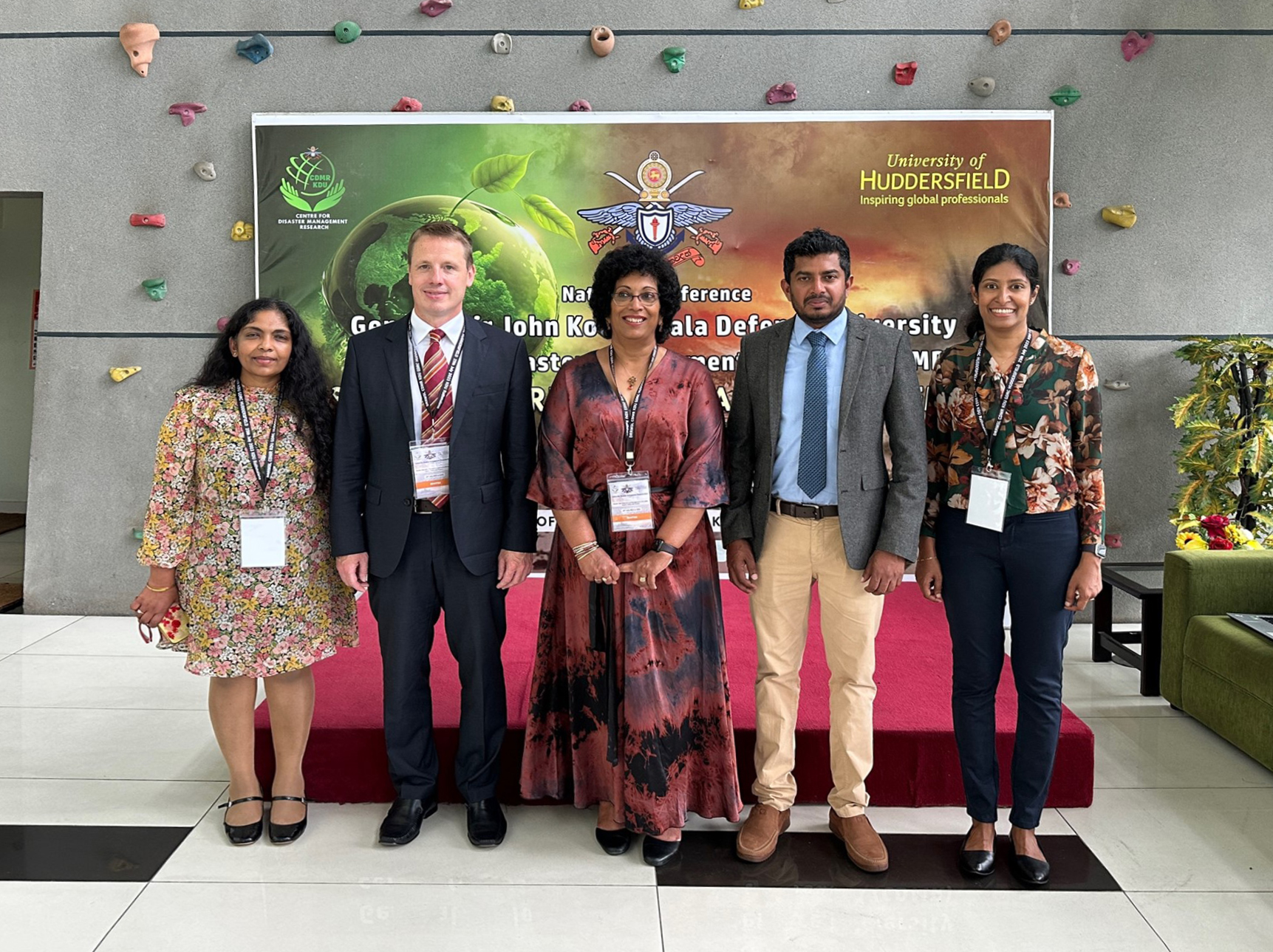
- Panellist, 2nd Global meeting of R-STAGS. UNDRR, November 2022. Invited by Global Risk Analysis and Reporting of UNDRR to be a panellist of the 2nd Global Meeting of R-STAGs. This was an opportunity to share experience and identify ways to improve alignment of R-STAGs to UNDRR efforts to enhance science-policy interface for disaster risk reduction and climate change adaptation, through reviewing R-STAGs contributions to the research priorities and overall science landscape. Intervention areas included: Understand risk creation and perpetuation in the contemporary risk landscape: systemic, cascading and complex risks; and Address inequalities, injustices, marginalisation and vulnerabilities. The need to link science more effectively with decision-making at the regional, national and local levels prompted the creation of a Regional Science and Technology Advisory Group (RSTAG). Its purpose is to promote coherence and build links between science and technology networks in the region, promote the development of research in disaster risk reduction as well as the application of information and scientific knowledge for the design of public policies and the decision making. The RSTAG contributes to improving the resilience of society through a better scientific understanding of disasters, promoting the use of technology and evidence-based decision-making.
- Invited Panellist, National event to commemorate the International Day for Disaster Risk Reduction (IDDRR). Theme: “Early warning and early action for all: Leave no one behind”, 13th October 2022 (Hybrid event). Launched from Hotel Cinnamon Lakeside, Colombo, Sri Lanka, organised by the Disaster Management Centre, Sri Lanka. The United Nations General Assembly has designated 13th October as the International Day for Disaster Risk Reduction (IDDRR) to promote a global culture of disaster risk reduction. It was an opportunity given to member countries to acknowledge the progress being made towards reducing disaster risk and losses in lives, health and livelihoods in line with the Sendai Framework for Disaster Risk Reduction 2015-2020. The 2022 edition of this international day focused on the objective of “substantially increasing the availability of and access to multi-hazard early warning systems and disaster risk information and assessments to people by 2030”, which is the seventh and final target of the Sendai Framework under the core theme of “Early warning and Early action for all”. The event provided a platform for leading local and foreign experts and academics in the sphere of disaster management and other associated key sectors to share their views and experiences on the importance of designing multi hazard, end to end, early warning systems with people in mind, and empowering them to act on time in an appropriate manner to reduce potential harm. The Huddersfield intervention was on Flood early warning systems: UK as a case point.
- Panellist of the World Urban Forum (WUF) 11: Networking event: Disaster Risk Reduction COVID-19 preparedness at local level, World Urban Forum, 11th session, 26-30 June 2022, Katowice, Poland. This high-level panel discussed how cities managed to adapt to the COVID-19 crisis and the lessons learned.This session showcased how cities and partners are working together under the framework of Resilient 2030 initiative to create solutions and share these practices with peer cities. It provided critical problems that need to be better understood to improve epidemic and pandemic preparedness level. The World Urban Forum (WUF) was established in 2001 by the United Nations to address one of the most pressing issues facing the world today: rapid urbanization and its impact on communities, cities, economies, climate change and policies. Convened by UN-Habitat, the Forum is a high level, open and inclusive platform for addressing the challenges of sustainable urbanisation and is the foremost international gathering for exchanging views and experiences on sustainable urbanization in all its ramifications. This session is organized by the Making Cities Resilient 2030 (MCR2030) Regional Coordination Committee in Europe and Central include several UN Agencies, such as UNDRR, UNDP, UNECE, UN-Habitat and WHO, different cities’ international organizations such as Resilient Cities Network, ICLEI, the Swedish Civil Contingencies International Federation of Red Cross and Red Crescent Societies, and the University of Huddersfield, UK
- Panellist at the Round Table Discussion on Climate Change and its impact of the Built Environment, Colombo, Sri Lanka, 23rd March 2022. Orgnaised by University of Moratuwa, Sri Lanka, in collaboration with the EU Erasmus+ co-funded collaborative research project, “BEACON (Built Environment leArning for Climate adaptatiON)”. My intervention was on the Climate Change Adaptation and Disaster Risk Reduction Policy Coherence. This session examined the resilience of the built environment to the impacts of climate change.
- Panellist on the University Enterprise Collaboration for Disaster Resilience: Opportunities in the Sri Lankan Context, 15th March 2022. Organised as part of the Colombo Symposium hosted by the SECRA team of the University of Sri Jayewardenepura, Sri Lanka. My intervention was on the pathways to research, collaborate, as well as seek funding for projects related to disaster resilience.
- Panellist at the Round Table Discussion on Climate Change and its impact of the Built Environment, Colombo, Sri Lanka, 23rd March 2022. Organised by University of Moratuwa, Sri Lanka in collaboration with the EU Erasmus+ co-funded collaborative research project, “BEACON (Built Environment leArning for Climate adaptatiON)”. My intervention was on the Climate Change Adaptation and Disaster Risk Reduction Policy Coherence. This session examined the resilience of the built environment to the impacts of climate change.
- Panellist of the CLIMATE CHANGE AND THE 2030 AGENDA FOR SUSTAINABLE DEVELOPMENT: THE CASE FOR POLICY COHERENCE international dialogue, 11th of February 2022. Organised by University of Colombo, Sri Lanka, in collaboration with the EU Erasmus+ co-funded collaborative research project, “BEACON (Built Environment leArning for Climate adaptatiON)”. My intervention was on the Paris Agreement, Sendai Framework and 2030 Agenda –Need for coherence in implementation. The session provided insights on the coherence of the Paris Agreement on Climate Change and the Sustainable Development Goals in the discourse of coastal built environment.
- Invited Panellist at the ceremonial launch of the Sri Lanka National Science Foundation (NSF) global digital platform (GDP), under the patronage of Hon. Mahinda Rajapaksa, Prime Minister of the Democratic Socialist Republic of Sri Lanka. February 2022. The NSF State-of-the-art Global Digital Platform (GDP) to harness Sri Lankan expatriates for national development has the requisite capabilities and features to harness, mobilize and channel intellectual assets at home and overseas. NSF is the premier national institution in Sri Lanka, mandated to promote R&D and scientific literacy for the socio-economic development and wellbeing of its people.
- Sustainable Future and Climate Change: Insights from Adaptation Gap Report 2020. Panellist at the Sustainable Future and Climate Change: Insights from Adaptation Gap Report 2020. It was organized by the National Institute of Disaster Management, Ministry of Home Affairs, Government of India, jointly with: Department of Science & Technology (DST), Government of India; UN-World Food Programme; United Nations Environment Programme; International Water Management Institute – CGIAR; Gorakhpur Environmental Action Group; UNICEF; ICUN-Council of Ecosystem Management; UN-ESCAP. 2021
- Panellist of the International Panel on Global Approaches for Disaster Resilience, December 2021, University of Colombo, Sri Lanka. Held in collaboration with the International Conference on Geography and Global Sustainability (ICGGS 2021), University of Colombo, Sri Lanka 10th of December 2021
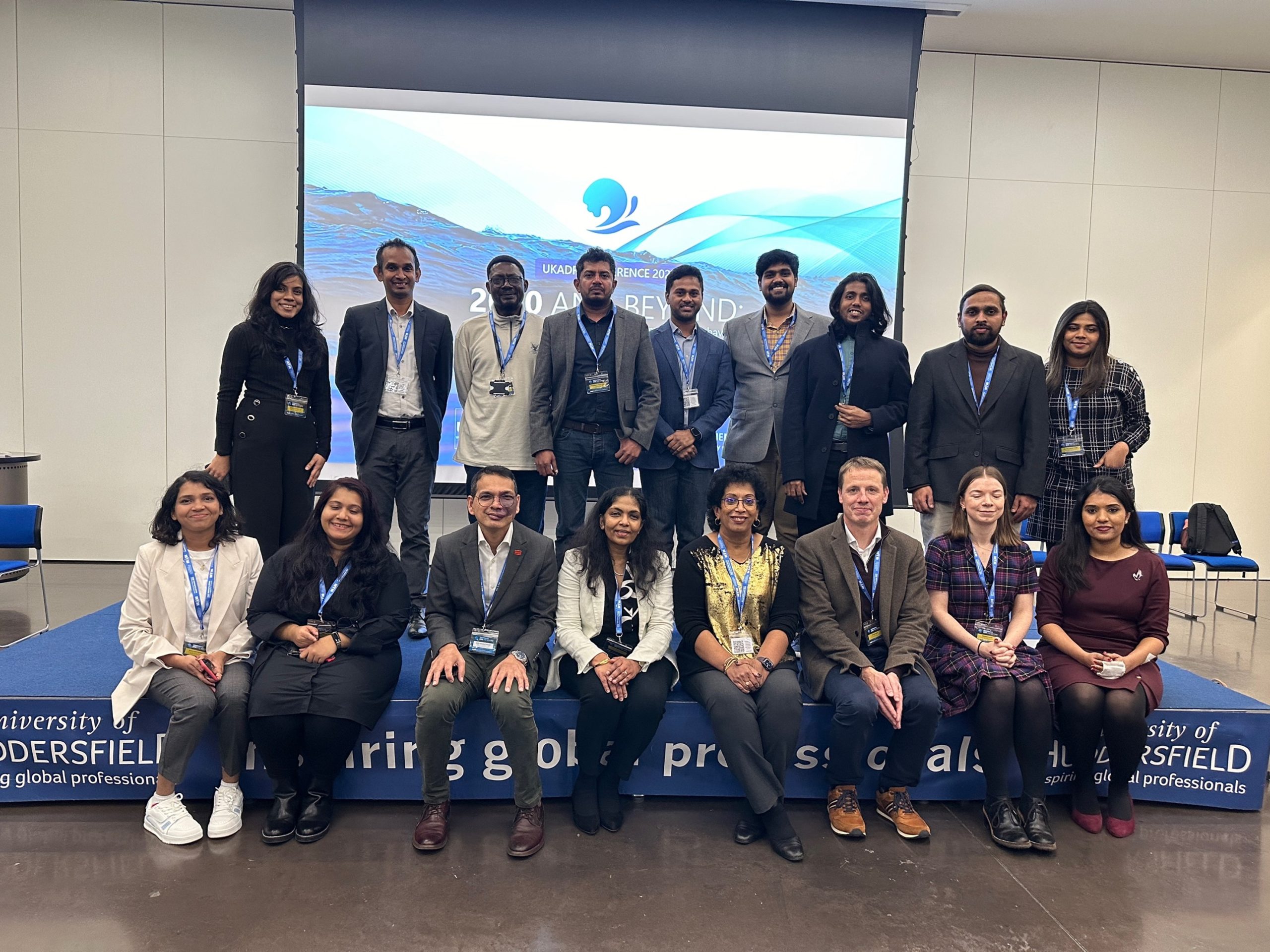
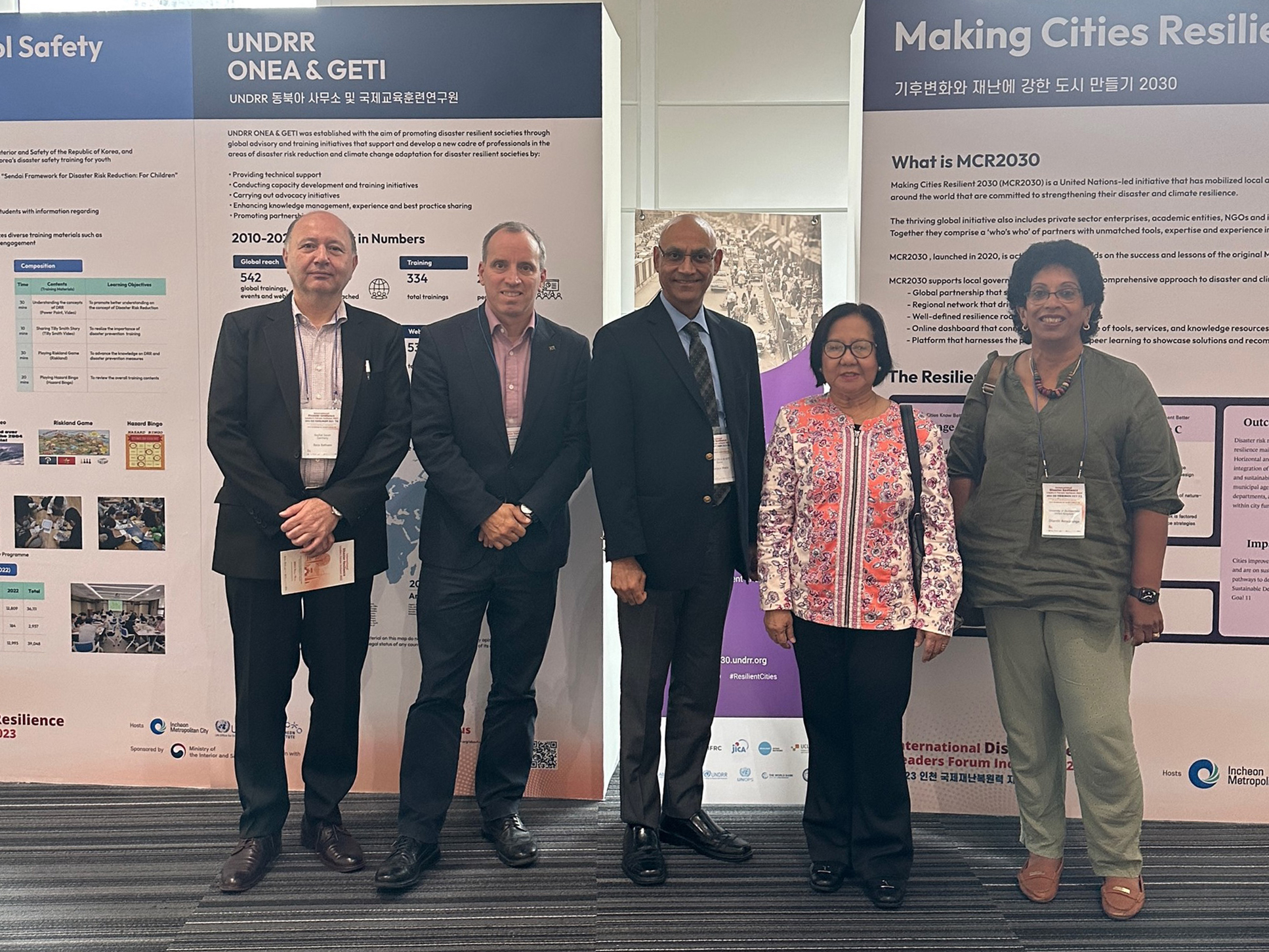
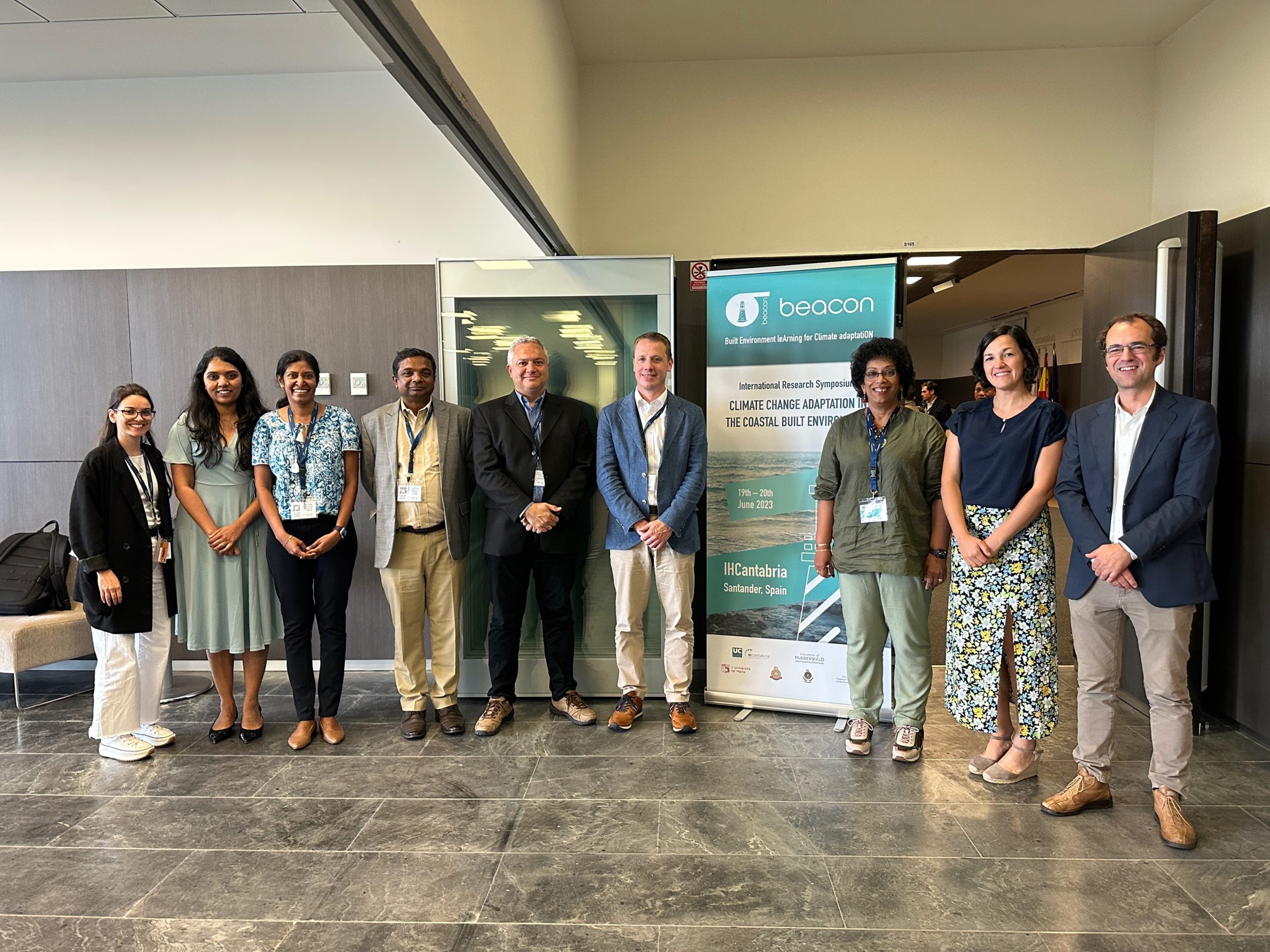
- Invited panellist, Main Event on Resilient Infrastructure, 2021 European Forum for Disaster Risk Reduction (UFDRR) , 25th November 2021, Matosinhos, Portugal. This main event identified the key factors that make infrastructure resilient including risk, recovery and functionality aspects, and review the status of resilient infrastructure in Europe and Central Asia; discussed the role of governance and policy mechanisms in making infrastructure resilient, and identify pathways to deal with complex interdependencies in order to facilitate evidence-based decision making; and identified how governments, policy makers and the private sector can step-up and deliver on their commitments. Organiser of this event was the UNDRR. The Forum, hosted by Portugal and organized by the United Nations Office for Disaster Risk Reduction (UNDRR) in partnership with the European Commission and the Council of Europe. My interventions were on Governance and Policy Mechanisms: What do we understand by “resilient” infrastructure and what should some basic metrics and principles of resilience look like?; and COVID-19 Recovery and Investment in Resilient Infrastructure : What are some of the incentives/good practices for engaging the private sector to invest in resilient infrastructure?
- Plenary session lead at the European Forum for Disaster Risk Reduction. Was appointed by the UNDRR (United Nations Office for Disaster Risk Reduction) as the Plenary session lead on “COVID-19 and Systemic Risk” co-lead, along with WHO. This is to be held at the EUROPEAN FORUM FOR DISASTER RISK REDUCTION (EFDRR), to be held from 24 – 26 November 21, in Matosinhos, Portugal. EFDRR is organised by the United Nations Office for Disaster Risk Reduction – Regional Office for Europe (UNDRR), Portuguese National Authority for Civil Protection, European Commission, and Council of Europe. The European Forum for Disaster Risk Reduction (EFDRR) forms the regional platform structure of Europe. The triennial EFDRR has established itself as an important vehicle to address the regional disaster risk challenges. It serves as a forum for other stakeholders to take a shared responsibility and make actionable commitments to reduce disaster risk. The conference, true to the multi-stakeholder spirit of the Sendai Framework, enables governments and stakeholders to exchange experiences on successful practices and innovative approaches to prevent, reduce and manage disaster risk. This results in forward looking action plans based on a mutual sharing status of DRR implementation.
- Invited panel member, the strategic pathway for further international cooperation for the Indian Ocean Tsunami Warning & Mitigation System within the UN Decade for Ocean Science. The core aim of the discussion was to develop a framework for action on a “Tsunami Dedicated Decade” under the UN Decade of Ocean Science for Sustainable Development (2021-2030). This was led and organised by the UNESCO Intergovernmental Oceanographic Commission (IOC) and the Secretariat for the Indian Ocean Tsunami Warning and Mitigation System (IOTWMS). November 2021
- Distinguished Panellist,Special Round Table Workshop on “Perspectives in Disaster Research: Status, Needs & Opportunities” on 15th November 2021. Held in collaboration with 5th World Congress of Disaster Management, jointly Organized by National Institute of Disaster Management (NIDM), New Delhi & Special Centre for Disaster Research (SCDR), Jawaharlal Nehru University (JNU), New Delhi. Appointed panel of experts discussed on different topics related to disaster research in Asia with will bring out issues, challenges and opportunities in effective policy making followed by an interactive session. Appointed panel of experts discussed on different topics related to disaster research in Asia with will bring out issues, challenges and opportunities.
- Panellist of the webinar It is all about Disaster Risk Governance. The Global Disaster Resilience Centre held a public Webinar to coincide with the United Nations International Day for Disaster Risk Reduction (IDDRR). Held on the 13th October each year, and a time to promote a global culture of disaster risk reduction. It is an opportunity for us all to acknowledge the progress being made toward reducing disaster risk and losses in lives, livelihoods, and health in line with the Sendai Framework for Disaster Risk Reduction that was adopted back in 2015. This year’s theme was about conveying the message that many disasters can be avoided or prevented if there are disaster risk reduction strategies in place., providing insights on the links to science and technology. October 2021
- Expert Panel member of the CIB ECR Event – Research Grant Funding, 15th September 2021. The aim is to guide ECRs in research grant applications. The session provides an opportunity for ECRs to pose questions to the expert panel. It was organised by the International Council for Research and Innovation in Building and Construction (Conseil International du Bâtiment), in collaboration with the Western Sydney University, CIB is a worldwide network of more than 3,000 experts from 95 organisations focused on all aspects of research and innovation in building and construction. CIB Members are institutes, companies and other types of organisations involved in research or in the transfer or application of research results. Member organisations appoint experts to participate in CIB Commissions.
- Panellist as a Co-Editor of the Book Launch on: “COVID 19: Impact, mitigation, opportunities and building resilience: From adversity to serendipity”, Perspectives of global relevance based on research, experience, and successes in combating COVID-19 in Sri Lanka, 30th July 2021, BMICH, Colombo, Sri Lanka. Meet the dedicated team behind this insightful book, published by the National Science Foundation of Sri Lanka. This book considers the challenges of building disaster resilience in South Asia – a region that frequently experiences some of the most severe and devastating impacts of disasters. It has 730 pages with 65 fully peer reviewed chapters, including keynote and plenary speeches and invited and technical papers, collating local and global perspectives of combatting the COVID-19 pandemic. It comprises nine sections, i.e. six themes namely Health, Mental Health and Wellbeing, Economy, Environment (Natural and Built), Resilience and Society and Education and three crosscutting themes, namely Governance, Supply Chain, and Research and Inventions. Each section has an Introduction which provides a brief overview on the relevance, scope of papers, their salient points, gaps and areas for future research investigations. It is published under the Creative Commons license: CC BY-NC-ND (Attribution-Non-Commercial-NoDerivs).
- Sustainable Future and Climate Change: Insights from Adaptation Gap Report 2020. Was a panellist at the Sustainable Future and Climate Change: Insights from Adaptation Gap Report 2020, held on the 25th January 2021. It was organized by the National Institute of Disaster Management, Ministry of Home Affairs, Government of India, jointly with: Department of Science & Technology (DST), GoI; UN – World Food Programme; United Nations Environment Programme; International Water Management Institute – CGIAR; Gorakhpur Environmental Action Group; UNICEF; ICUN-Council of Ecosystem Management; UN-ESCAP.
- Interdisciplinary Policy Dialogue on COVID 19: Impact, Mitigation, Opportunities and Building Resilience. Was the moderator of the Interdisciplinary Policy Dialogue on COVID 19: Impact, Mitigation, Opportunities and Building Resilience, held on the 28th January 2021 in Colombo, Sri Lanka. It was organised by the National Science Foundation of Sri Lanka.
- Integrating Epidemic and Pandemic Preparedness into Disaster Risk Reduction. Was a Panellist at the International Plenary Session on Integrating Epidemic and Pandemic Preparedness into Disaster Risk Reduction, held on the 15th December 2020
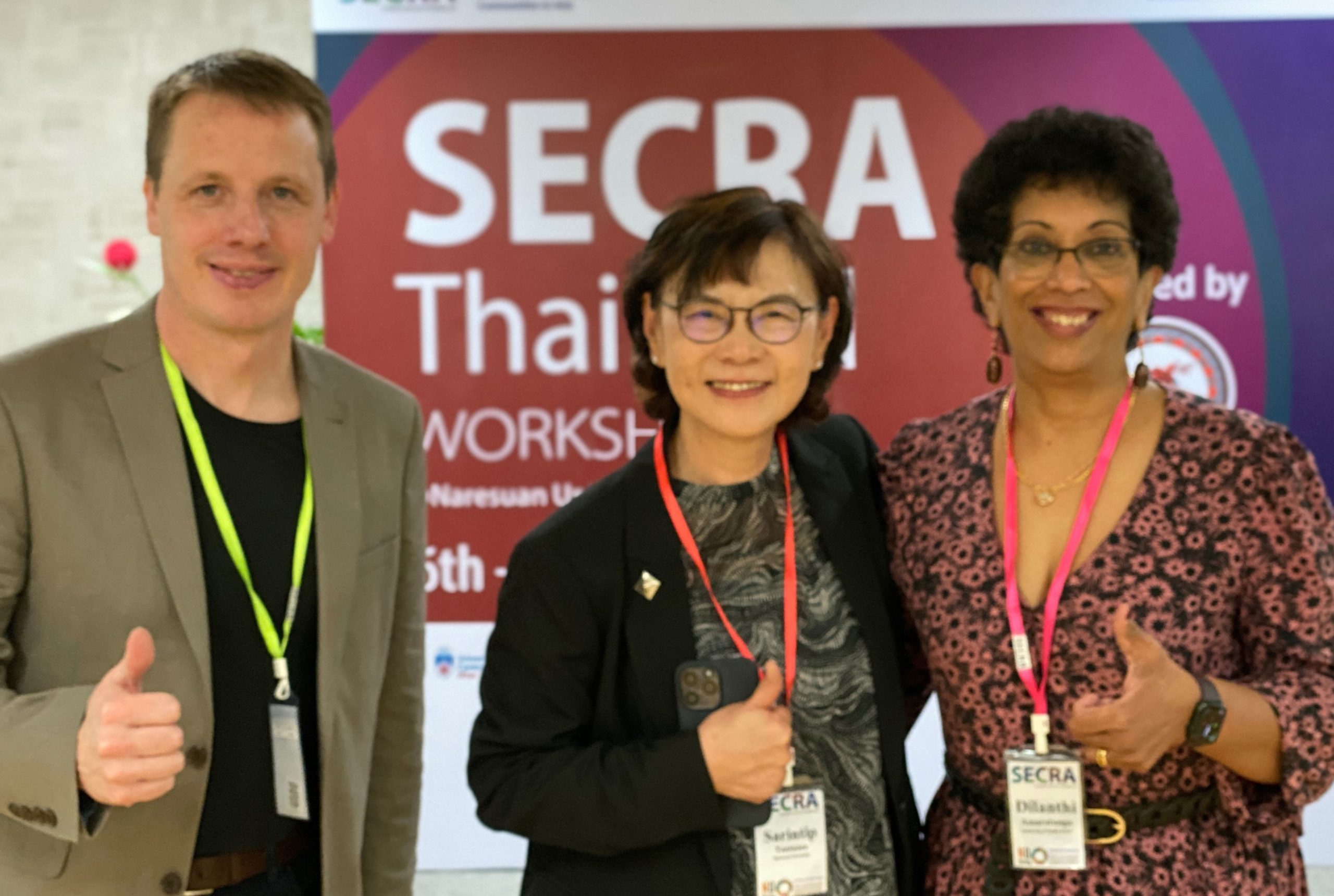
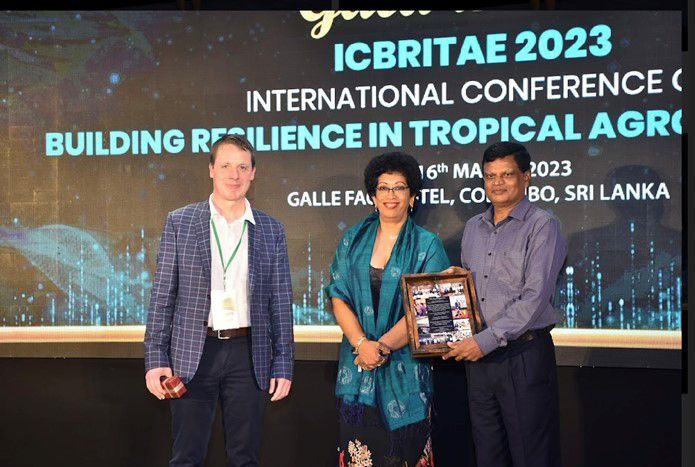
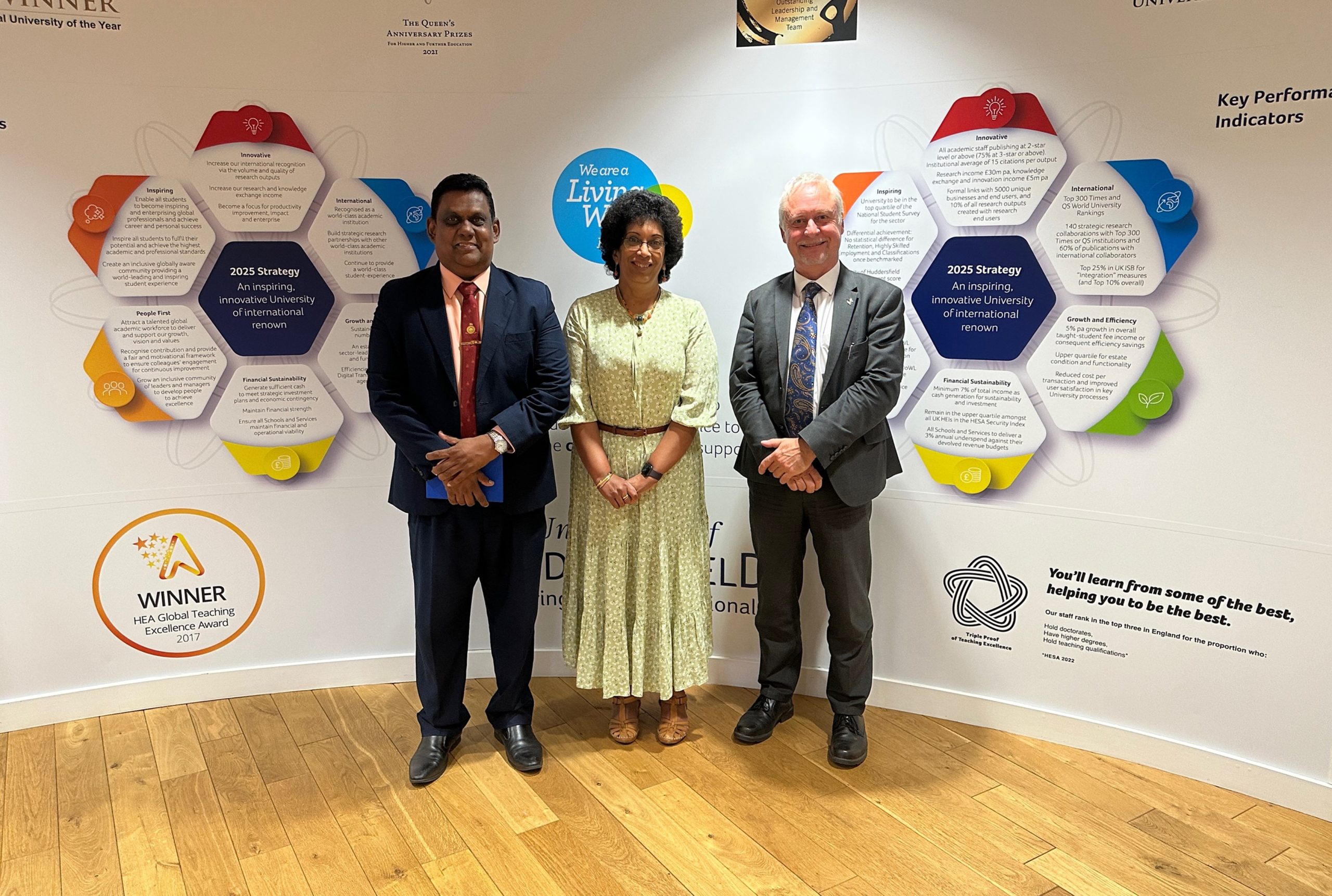
- Let’s Talk DRR. A panellist at the “Let’s Talk DRR”, A Series of UNESCO and U-INSPIRE Alliance Virtual Conversation on SETI for DRR Science into action in Disaster Risk Reduction, held on the 20th November 2020, Jakarta, Indonesia.
- Integrating Epidemic and Pandemic Preparedness into Disaster Risk Reduction. Was a Panellist at the International Plenary Session on Integrating Epidemic and Pandemic Preparedness into Disaster Risk Reduction, held on the 15th December 2020.
- Appointed by UNDRR as a panellist to formally review DRR National Strategy Assessment of Bulgaria. Other panellists included representatives from Government of Bulgaria (Director of State Control and Preventive Activity Directorate; Head of Preventive Activity Department; Head of Disaster Risk Reduction); Sendai National Focal Point – Sweden; Sendai Technical Focal Point – Serbia; 100 Resilient Cities Initiative – Local level resilience; Joint Research Centre of the European Commission; the World Bank. May 2020.
- Invited Panellist, Special session on the EU funded multi hazard early warning project, with interesting discussions on the impact of early warning on small island states, at the SBE19 Malta INTERNATIONAL CONFERENCE on Sustainability and Resilience, University of Malta, Malta, November 2019.
- A panellist of the Technical Session on “The role of green, blue and grey infrastructure in reducing disaster risks, at the UN Global Platform, Geneva, Switzerland- 17th May 2019. Discussions included the role these infrastructure plays in DRR, and their contribution for future urban risks scenarios considering global climate change. Organising team included: IUCN, UNU, UNECE, ARUP, Swiss DRR.
- A panellist of the UN European Science & Technology Advisory Group Plenary meeting held in Geneva, Switzerland. UNDRR-Europe Deputy Chief, Mr. Abhilash Panda chaired the event with the participation of UN SRSG (UN Special Representative of the Secretary-General for Disaster Risk Reduction) for DRR, Ms. Mami Mizutori, Geneva, Switzerland- 14th May 2019.
- A panellist of the Round Table discussion on Disaster Risk Reduction and Climate Change Adaptation, hosted by Centre for Engineering and Sustainable Development Research of DLSU University, Manila. Philippines, March 2019.
- Panellist (intervention on barriers and enablers for multi hazard early warning), Forum on Multi Hazard Early Warning Systems and Evacuation Planning in Sri Lanka, organised by CABARET Erasmus+ Higher Education Capacity Building Project, University of Moratuwa, University of Peradeniya, University of Huddersfield, 16th January 2019.
- Panel lead on a discussionabout the current landscape and future opportunities for advancing the dialogue between DRR and urban cities. International research workshop on: Localising strategies for making cities resilient to disasters, 22th January 2018 to 26th January 2018, Manila, The Philippines.
- An expert panel to lead a discussion about the current landscape and future opportunities for advancing the dialogue between DRR and urban cities. International research workshop on: Localising strategies for making cities resilient to disasters, 22th January 2018 to 26th January 2018, Manila, The Philippines.

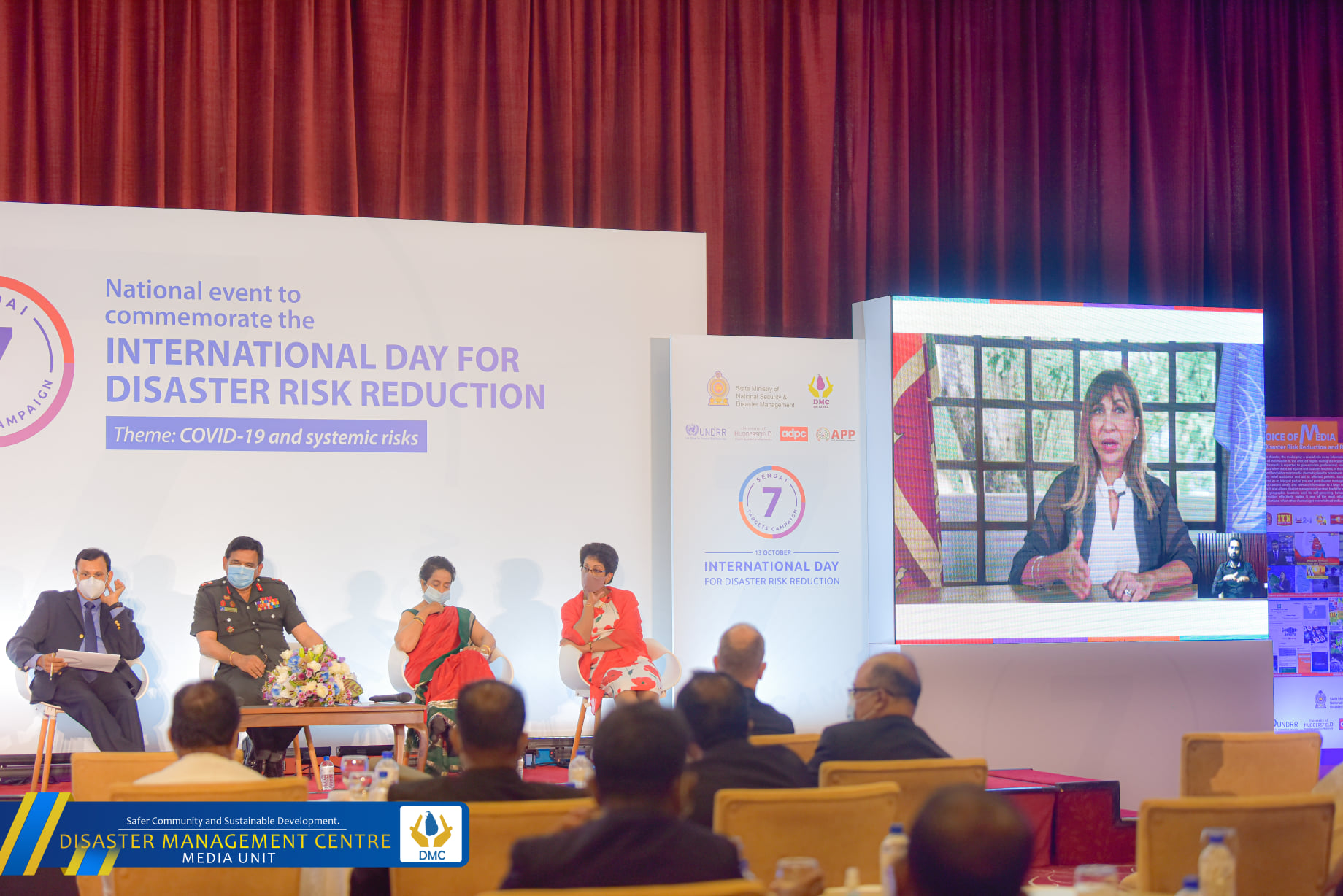
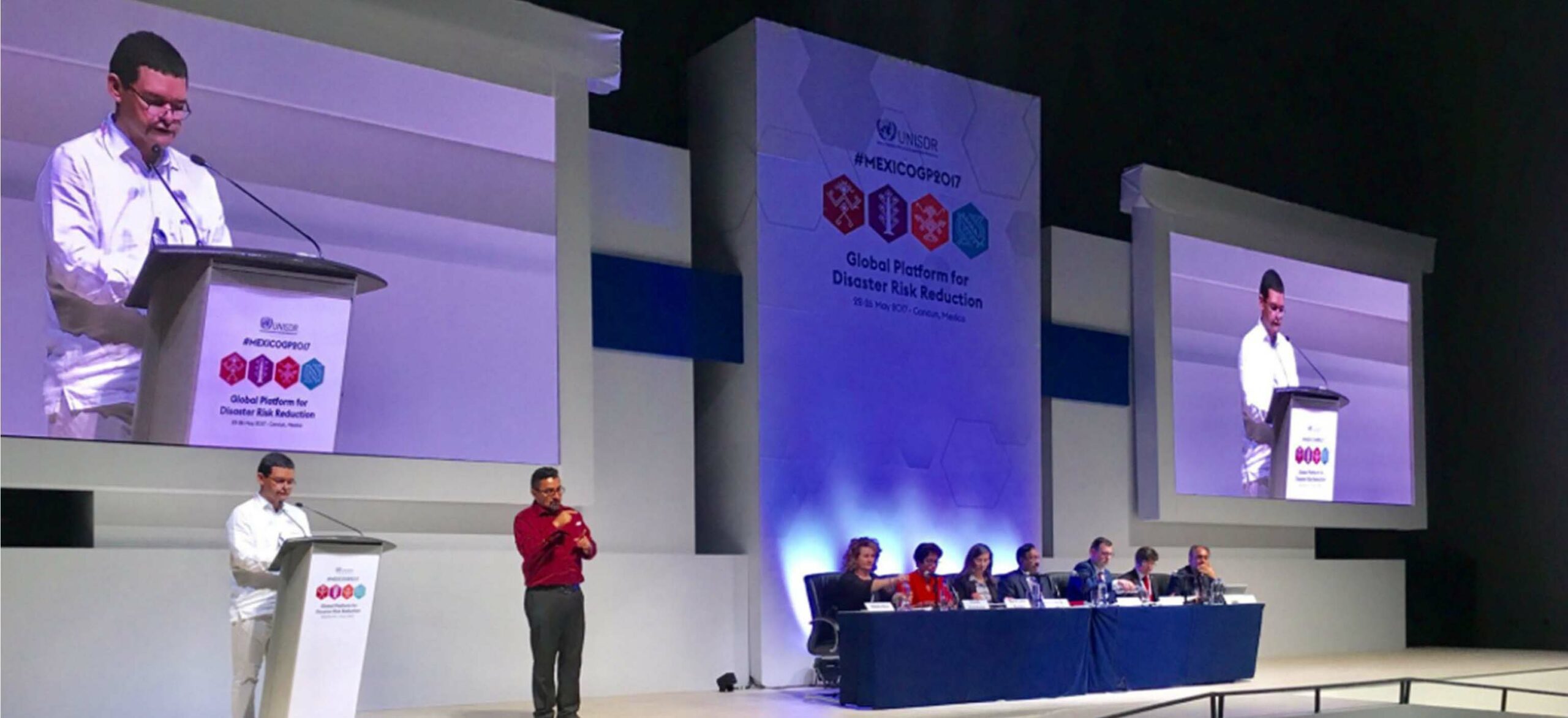
- ‘Towards evidence-based policy’ debate – Reconciliation through Reconstruction and Resettlement. Panel of Experts. The panel explored the emerging evidence and provide a basis for policy development aimed at reconstruction and resettlement that contributes to, rather than hinders reconciliation efforts. Proposers: Siri Hettige, Professor of Sociology Emeritus, University of Colombo, Sri Lanka; Dilanthi Amaratunga, Professor, Global Disaster Resilience Centre, University of Huddersfield, UK; and Richard Haigh, Professor, Global Disaster Resilience Centre, University of Huddersfield, UK. November 2016.
- Panel co-lead, panel discussion on Disaster Resilience education, 10th International Conference of The International Institute for Infrastructure Resilience and Reconstruction (I3R2): Collaboration for Effective Disaster Mitigation and Response was held from May 20-22, 2014, Purdue University, Indiana, USA
- Lead, Panel discussion on CADRE (Collaborative Action towards Disaster Resilience Education), CIB International Conference 2014: W55/65/89/92/96/102/117 & TG72/74/81/83 Construction in a Changing World; Kandalama, Sri Lanka, May 2014.
- Lead of the expert panel for a discussion about the current landscape and future opportunities for advancing the dialogue between DRR and urban cities. International research workshop on: LOCALISING STRATEGIES FOR MAKING CITIES RESILIENT TO DISASTERS, 22th January 2018 to 26th January 2018, Manila, The Philippines.
- Moderator of the session: “Understanding Urban and Local Challenges and opportunities”, at the 2018 European Forum for Disaster Risk Reduction (EFDRR), held from 21 to 23 November 2018 in Rome, Italy. EFDRR was organised by the Government of Italy, UNISDR in partnership with European Commission and Council of Europe. This session debated the key challenges and opportunities to accelerate local level action on disaster resilience, and support progress on Target (e) of the Sendai Framework for Disaster Risk Reduction to substantially increase the number of countries with national and local disaster risk reduction strategies by 2020, including: Integrated Disaster risk reduction (DRR) and climate change adaptation (CCA) strategies, and Large-scale forced migration and displacement.
- Co-organiser, Focal Point & a Panellist of the Formal Session on Disaster Risk Reduction Governance at the Global platform for Disaster Risk Reduction, 22 – 26 May 2017, Cancun, Mexico. Other Panellists included: Carlos Iván Márquez Pérez, Director National Unit for Disaster Risk Management in Colombia; María Luisa Romero. Minister of Government of Panama; Dr. Fadi Hamdan, Managing Director. Disaster Risk Management Center (DRMC), Lebanon; and Ms. Natalia Ilieva, Executive Assistant to the Secretary General of Asia Pacific Broadcasting Union (ABU). The Global Platform for Disaster Risk Reduction (Global Platform), as recognized by the UN General Assembly, is the main forum at the global level for strategic advice, coordination, partnership development and the review of progress in the implementation of international instruments on disaster risk reduction. The Global Platform marked the first opportunity for the international community to review global progress in the implementation of the Sendai Framework for Disaster Risk Reduction, which was adopted in Japan in 2015. More than 5,000 participants attended, including policy makers and disaster risk managers.
- Panellist at the Technical Session 2 – Disaster Risk Governance.Asian Ministerial Conference on DRR 2016 (AMCDRR), held from 02 – 05 November 2016 at Vigyan Bhawan, New Delhi, India. This first Asian Ministerial Conference for Disaster Risk Reduction after the advent of the Sendai Framework was hosted by the Government of India in November 2016 under the theme “Risk Sensitive Development for Community Resilience” and was organised by the Ministry of Home Affairs, in collaboration with UNISDR and with the support from International and National Development Partners. This panel provided direct input to Delhi Declaration Asia Regional Plan for Implementation of Sendai Framework representing the DRR Governance and Accountability Panel. This panel was chaired by H.E. Saber Chowdhury, Member of Parliament, Bangladesh, 28th President of IPU, Co-Chair of UNISDR Asia Advisory Group of Parliamentarians for DRR. Other panellists included Her Excellency Isabel Amaral Guterres, Minister, Ministry of Social Solidarity, Timor-Leste, Prof. Chandrashekhar, Hon. Minister, Disaster Management Department, Government of Bihar, India and Prof. Ali Ardalan, Advisor to Deputy Minister and Head of National Disaster Management Office (NDMO), Iran.
- Invited Technical panel member to provide input Asia Regional Plan for Implementation of the Sendai Framework for Disaster Risk Reduction 2015-2030, a plan endorsed by the countries for the Asian region, representing the DRR Governance and Accountability Panel, Asian Ministerial Conference on Disaster Risk Reduction 2016, November 2016, New Delhi, India. Other outcomes included: A political declaration – consolidating the political commitment of governments towards preventing and reducing risk as well as strengthening resilience by accelerating implementation and monitoring of the Sendai Framework in the region; and Stakeholder action statements – voluntary statements of action of stakeholder groups towards a ‘shared responsibility’ approach in implementation of the Sendai Framework.
- Commemoration of the First Ever World Tsunami Awareness Day on the 5thNovember 2016 in New Delhi, India. The UN Secretary-General’s Special Representative for Disaster Risk Reduction, Mr. Robert Glasser, initiated a moment’s silence in remembrance of all those who have lost their lives in tsunamis as the first World Tsunami Awareness Day was commemorated on the final day of the Asian Ministerial Conference for Disaster Risk Reduction. Delhi, India. 2016
- Panel Co-chair – Roundtable discussion on the role of Higher Education in supporting implementation of the Sendai Framework for Disaster Risk Reduction 2015-2030, 5th International Conference on Building Resilience, Newcastle, Australia, 15th – 17th July 2015
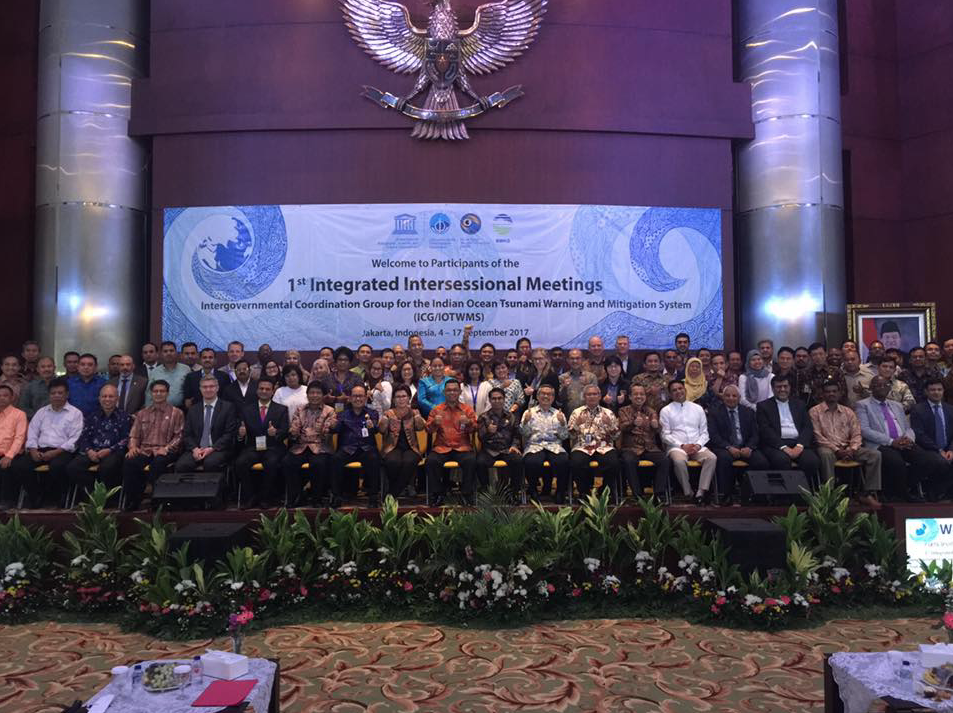
- Multi-Stakeholder Segment, Working Session: “Applying Science and Technology to Disaster Risk Reduction Decision-Making” as a member of the Science and Technology Major group at the UN World Conference on Disaster Risk Reduction held in Sendai, Japan, March 2015. This session set the agenda for the future of science and research for disaster risk reduction and explore new partnerships for promoting evidence-based disaster risk reduction for sustainable development. The session also discussed the proposal of the scientific community to re-initiate an international scientific advisory mechanism for disaster risk.
- Panel member of the policy dialogue – Tsunami Recovery in Sri Lanka: Ten Years On, 5th December 2014, Galle Face 6 Conference Hall, Galle Face Hotel, Colombo, Sri Lanka. Organized by SPARC, University of Colombo, Sri Lanka; Global Disaster Resilience Centre, University of Huddersfield, UK; University of Moratuwa, Sri Lanka; and CASCADE Project (European Union’s Seventh Framework Programme (FP7/2007-2013) under grant agreement n° 609562). This was an attempt to capture the insights and conclusions that emerge from the event which will be used to inform policy for the international community, as well as national and local government.
- Panel member, regional workshop on Coastal Hazards and Tsunami Risk Assessment and Management, which is based on the IOC Guidelines on Tsunami Risk Assessment and Mitigation for the Indian Ocean, University of Moratuwa, Colombo, Sri Lanka, from 29 September – 1 October 2014
- Policy briefing panel member: Research needs for disasters and development, Thursday 28 November 2012, RMIT University, Melbourne, Australia.
- International Panel Discussion on “Built Environment Education Trends”. International Research Conference on Sustainability in the Built Environment, The Commonwealth Association of Surveying and Land Economy (CASLE) UK and Building Economics and Management Research Unit (BEMRU), Department of Building Economics, University of Moratuwa, Sri Lanka, June 2010.